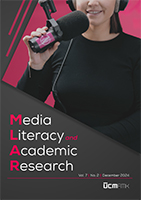What Young People Know and Think They Know about Politics: Factors Influencing Political Knowledge among Romanian First-Time Voters
What Young People Know and Think They Know about Politics: Factors Influencing Political Knowledge among Romanian First-Time Voters
Author(s): Nicoleta Corbu, Dana Raluca Buturoiu, Mădălina Boţan, Valeriu FrunzaruSubject(s): Politics / Political Sciences, Social Sciences, Education and training, Political Sciences, Political behavior, Political psychology, Social psychology and group interaction
Published by: Univerzita sv. Cyrila a Metoda v Trnave, Fakulta masmediálnej komunikácie
Keywords: Civic Attitudes; Dunning-Kruger Effect; Political Efficacy; Political Knowledge; Young People;
Summary/Abstract: As they approach voting age, young people aged 17 to 19 years old are at a significant turning point in their political development. In this formative stage, their perceptions and understanding of the political landscape depend, among other things, on the diversity of information sources and content to which they are exposed to on a daily basis. In such a context, political knowledge plays a key role in informed decision-making for first-time voters. However, many young people tend to overestimate their levels of political knowledge, a phenomenon explained by the Dunning-Kruger effect. This study examines factors influencing both factual and perceived political knowledge among Romanian high school students (N=519). The main findings reveal a significant discrepancy between the actual political knowledge of young people and their perceived understanding of political matters. Political efficacy (the belief in one’s ability to understand and engage in politics) proves to be a strong predictor of both factual and perceived political knowledge. Those with high levels of political efficacy are not only more informed but also believe they know more about politics than their peers. Furthermore, results show that young people who believe they know more than their peers about political affairs consume more mainstream media news, but no other correlation of political knowledge with news consumption is significant. Additionally, while male students perceive themselves as more knowledgeable than females, no significant gender differences in factual knowledge were observed. These findings highlight the need for educational strategies to improve both political knowledge and efficacy, contributing to a more informed and participatory youth electorate in Romania.
Journal: Media Literacy and Academic Research
- Issue Year: 7/2024
- Issue No: 2
- Page Range: 5-22
- Page Count: 18
- Language: English

